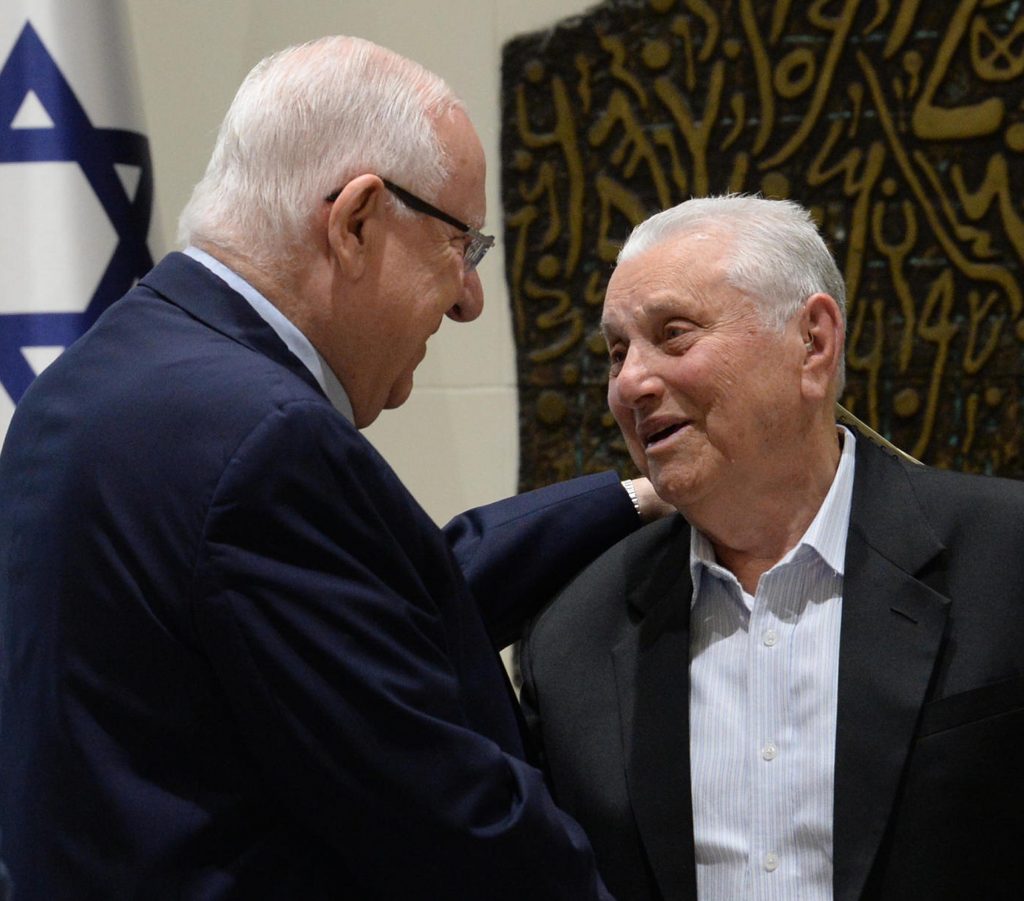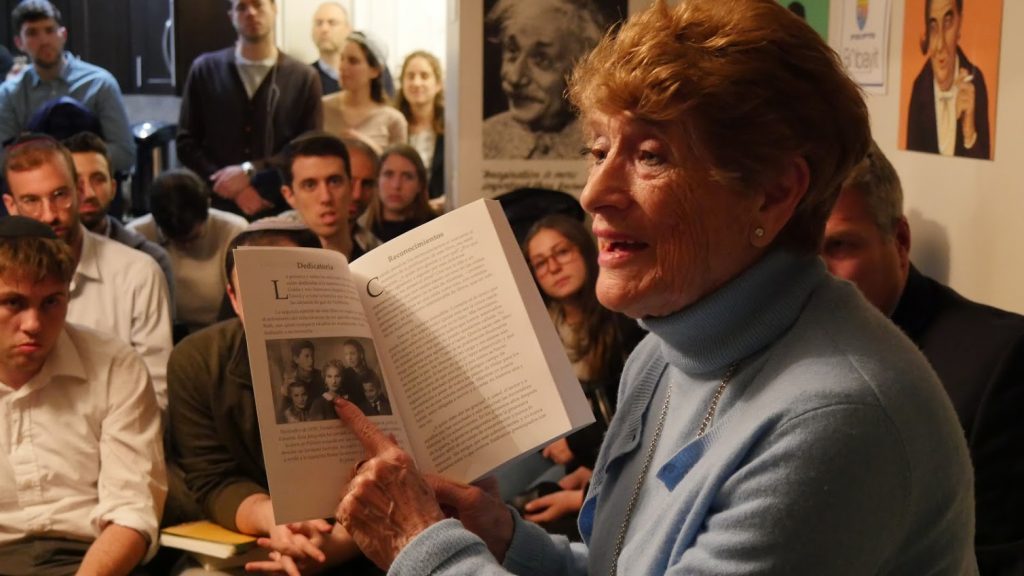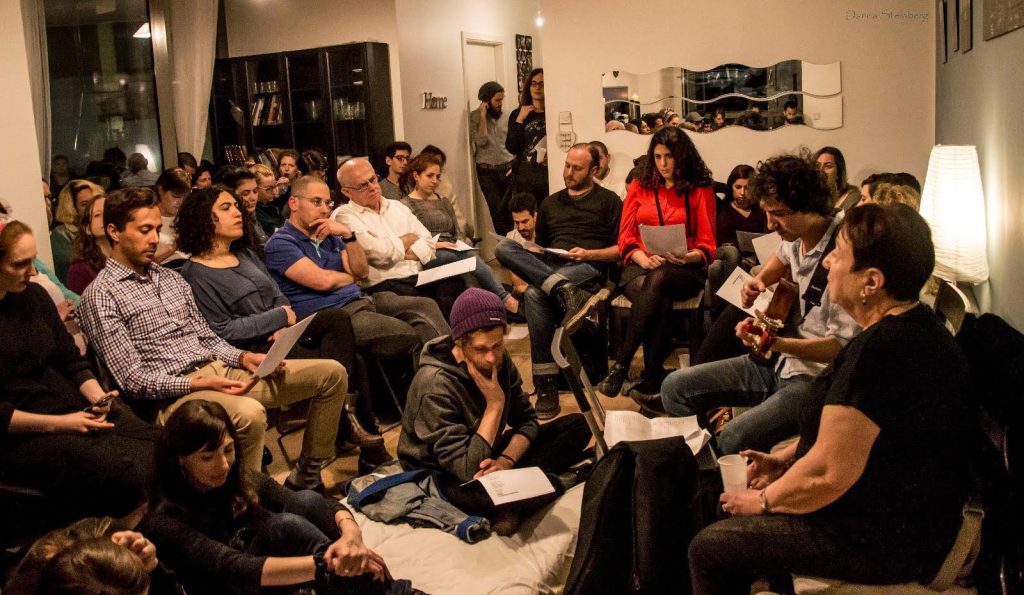A unique commemoration initiative debuted in Israel at the beginning of this decade brought together some 500,000 people across the world – even those who were mid-flight across the Atlantic – for a series of events this week to honor the six million Jewish victims of the Holocaust.
The events coincide with Holocaust Remembrance Day marked in Israel every year over 24 hours with state ceremonies and events, and the wail of a siren that brings the country to a standstill for two minutes as all transportation stops and pedestrians bow their heads in silence. The day of remembrance began at sundown Wednesday.
SEE ALSO: A Holocaust Story For The Social Media Age: Eva ‘Posts’ On Instagram About Life In 1944’s Hungary
Zikaron BaSalon (literally “Remembrance in the Living Room”) was founded in 2011 to provide a different experience of collective remembrance, through testimony and discussion in more intimate settings. In private homes, communal halls and community centers, families, friends and guests gather to hear the personal stories of Holocaust survivors, their children, and grandchildren and participate in an engaging discussion about their thoughts and emotions.
This year, in addition to events in Tel Aviv, Jerusalem, New York, Jacksonville, Lima, and Buenos Aires, the gatherings also took place in Israeli prisons – and even on an El Al flight from Toronto to Poland as part of a Canadian contingent of a March of the Living trip.
Hedy Bohm, a Holocaust survivor born in Romania in 1928, took the public intercom to tell her story on the flight on Monday. She survived Auschwitz and Fallersleben, a labor camp in Germany, and moved to Canada in 1948.
Bohm was en route to participate in her sixth March of the Living journey, an annual program that gathers over 10,000 youth – Jews and non-Jews – from dozens of countries across the world, alongside survivors and dignitaries in Poland to witness the remnants of the Holocaust. The trip includes a three-kilometer march from Auschwitz to Birkenau.
Earlier this week, Israeli President Reuven Rivlin held his fourth Zikaron BaSalon event at the President’s Residence in Jerusalem, hosting Holocaust survivor Yosef Hershkovich, 90, born in Sighet in northern Transylvania.
Rivlin said he was “deeply grateful” for the opportunity to host the event, and hailed its importance.
“The Holocaust is not only a historical event or entry in the dictionary. It is, amongst other things, a tapestry of whole worlds, personal stories – each one unique. By hearing testimony, we are able to learn the story of one person, one man or woman, and by extension the collective story of the Jewish people,” he said to participants.
“Keeping alive the flame of memory has never been more crucial. Only if we know our past will we able to face those outsiders who seek to speak in the name of the Jewish people, to appropriate our forgiveness and to question the truth,” he added.
Sign up for our free weekly newsletter
Subscribe
President Reuven Rivlin and Holocaust survivor Yosef Hershkovich at a Zikaron BaSalon event on April 28, 2019. Photo by Mark Neiman /GPO
Zikaron BaSalon was founded in Israel in 2011 by social entrepreneur Adi Altschuler. In recent years, the events have spread to Jewish and non-Jewish communities across the world.
Zikaron BaSalon events last between two to three hours and are comprised of three parts beginning with the testimony of a Holocaust survivor, or the child of a Holocaust survivor or an expert in the field. Then comes an act of collective expression, through poetry, art, music or any other form. Finally, participants are invited to discuss their thoughts and ask any questions.
Testimonies and discussion materials are available through the Zikaron BaSalon website for communities without access to Holocaust survivors or experts. They can screen or read real survivor testimonies at the events and then launch into the rest of the structure. Hosts are encouraged to shape each event to suit the needs of their groups and consult a “host kit” provided by the organization.
Speaking at the president’s event on Sunday, Altschuler said the events are “part of the new tradition we are creating” to “remind[s] us not to close our eyes to what is happening amongst us and around us, to recognize that we have the right to live in a safe and free country and to ensure it remains so.
“In the near future, we will confront a reality where there are no more Holocaust survivors with us. We must ensure there are other ways to preserve Holocaust memory and thus a more moral and united society. I invite you all to host and to participate in the memorial evenings that are taking place all over the country,” she added.
Israel’s Holocaust Remembrance Day and the March of the Living program this year come amid a startling report on the resurgence of anti-Semitism worldwide.
The report, published Tuesday by Tel Aviv University’s Kantor Center in conjunction with the European Jewish Congress, notes a 13 percent increase in “major” anti-Semitic incidents worldwide in 2018 — 387, compared to 342 in 2017. The most serious incidents were recorded in the United States, with over 100 cases, the UK with 68, France and Germany (35 each), Canada (20), Belgium (19), the Netherlands (15), and Argentina (11).
SEE ALSO: VR Tech Is Playing A Key Role In Holocaust Education And Awareness
The report came several days after a self-proclaimed white nationalist killed a 60-year-old woman and injured several others in a shooting at a synagogue in Poway, California, and some six months after 11 congregants were murdered in a similar attack in Pittsburgh.
The most disturbing development, the report says, “is that Jews in some countries feel they live in a state of emergency, because of the continuing rise, most notably in Western Europe and North America, in anti-Semitic manifestations.”
“For years, I think a lot of survivors have had the feeling that times remind us of the 1930s,” Bohm told The Times of Israel.
“Unfortunately, I feel the same way too — that humanity hasn’t learned, that we are unable to learn. History repeats itself. We try to remember, we try to be smarter, we try, and that’s all we can do — keep on trying,” she said.
Related posts

Rehabilitation Nation: Israeli Innovation On Road To Healing

Israeli High-Tech Sector 'Still Good' Despite Year Of War






Facebook comments